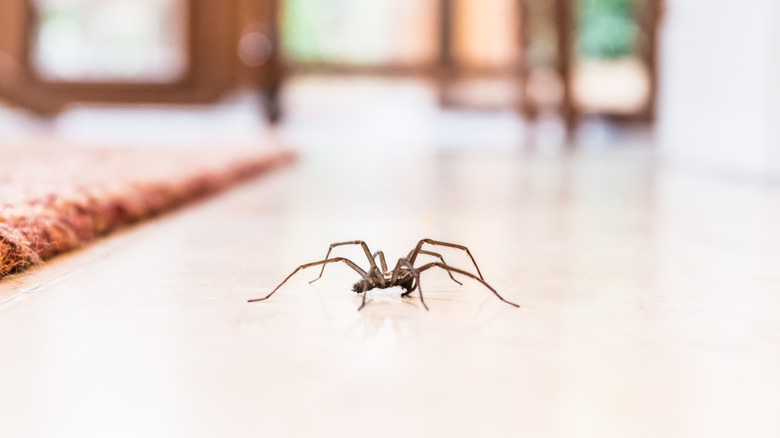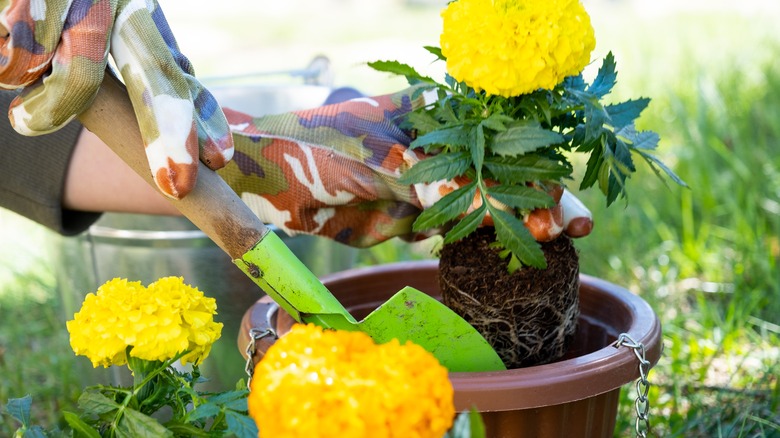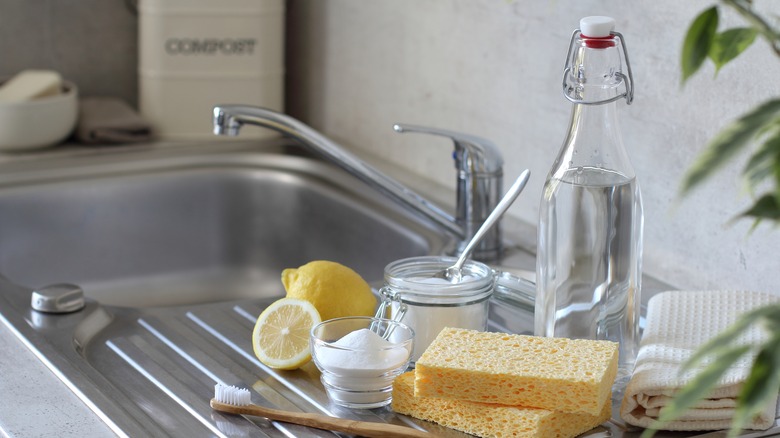The Beautiful Flower You Should Be Growing In Your Home To Keep Spiders Out
As the temperatures begin to wane, particularly from September to October, an uninvited guest often finds its way into our homes: the spider. Not many of us harbor the desire to cohabitate with these eight-legged invaders, who trot in seeking warmth and sustenance. And while most spiders are non-threatening to humans, their bites inducing merely minor irritation, encounters with the venomous likes of the black widow or brown recluse are experiences we'd rather not fancy. There are ways to keep spiders at bay, but today's spotlight is on a rather unconventional defender — marigolds.
The marigold plant is a marvel of nature, adorned with luxuriant blossoms spanning an array of tantalizing colors that effortlessly enhance any indoor space. From white to red, orange, yellow, copper, and even mesmerizing amalgamations of these hues, all can elevate the aesthetics of space while invigorating it with a sense of warmth and liveliness. However, this flower isn't just a feast for the eyes — it pulls double duty as a pest repellent. According to a 2021 study by BMC Veterinary Research, marigolds emit a distinctive, pungent odor courtesy of the terpenes in their foliage. It's believed that this scent is strongly offensive to spiders, causing them to steer clear of spaces graced with its presence. While this might seem like a magic bullet, a marigold's efficacy is anchored in proper planting and diligent care.
Growing marigolds for optimal spider control indoors
You'll find marigolds in a myriad of sizes. While the towering variants can reach 2 feet, the compact alternatives (think Safari Scarlet, Discovery Yellow, and Red Cherry) are excellent for interior spaces. Two popular marigold-cultivating techniques prevail: from seeds or stem cuttings. Pot selection is the first crucial step for seed nurturing — choose one with drainage holes, then fill it with a well-draining, nutrient-rich potting mix. Scatter your seeds, cover them lightly with the potting mix, and your marigold journey begins.
Marigold's watering regime is a delicate dance. Drowning them in water summons rot and fungi. Conversely, waiting until they face drought leads to wilting and death. So, water when the top soil layer dries out, or let a moisture meter guide you. Marigolds, like true sun-worshipers, crave their daily rays. A sun-drenched window is an idyllic spot for them, although you could use grow lights as an alternative. Caution: monitor the sun exposure and keep the plants away from direct heat sources, as excess temperatures can burn the leaves.
Even heroic marigold knights need some nutritional backup. Initially, a balanced slow-releasing blend of nitrogen, phosphorous, and potassium will provide your marigolds will do the trick. If you're propagating this flower from stem cuttings, the trimmed cuts must be submerged in a glass with 3 inches of water and nurtured in a brightly lit spot. Refresh the water frequently and witness the birth of new roots, marking the perfect time for transplantation.
Other natural ways to keep spiders out of your house
Fancy a quicker spider deterrent? Plenty of natural alternatives to marigolds can keep those eight-legged invaders at bay. First on our list are essential oils like peppermint and eucalyptus. Their remarkably strong aroma is no picnic for your eight-legged house intruders. Keeping spiders away using essential oils requires only about 15 drops diluted with water, then applied with a spray bottle. Then we have vinegar ― its acetic acid reacts with their bodies upon contact, and its scent is not quite a favorite either. A concoction of equal parts vinegar and water will do the trick here.
Equally, when rubbed on surfaces, citrus peels give off an unpleasant odor to spiders, making them suitable decoys for your problem areas. The vitality of diatomaceous earth can't go unnoticed. While to our eyes, it's merely powder, to spiders, it's shards of glass ruthlessly piercing their exoskeleton, causing a fatal leakage of fluids. Remember to keep the areas where this powder is applied dry.
Another natural spider repellent is homemade garlic spray, thanks to its odor. Blend four garlic cloves, dilute the puree with water, let it sit for a day, and then strain it into a spray bottle. Saline solutions also swoop in this battle, empowered by their dehydration prowess. Spraying an ounce of salt dissolved in a gallon of warm water fits the bill. Lastly, cracks and holes that provide entrances for spiders are better sealed off.


